Related Research Articles

The Industrial Workers of the World (IWW), members of which are commonly termed "Wobblies", is an international labor union that was founded in 1905 in Chicago, Illinois, in the United States. The union combines general unionism with industrial unionism, as it is a general union, subdivided between the various industries which employ its members. The philosophy and tactics of the IWW are described as "revolutionary industrial unionism", with ties to both socialist and anarchist labor movements.
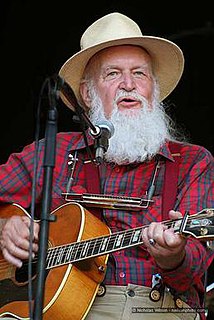
Bruce Duncan "Utah" Phillips was an American labor organizer, folk singer, storyteller and poet. He described the struggles of labor unions and the power of direct action, self-identifying as an anarchist. He often promoted the Industrial Workers of the World in his music, actions, and words.

John Llewellyn Lewis was an American leader of organized labor who served as president of the United Mine Workers of America (UMW) from 1920 to 1960. A major player in the history of coal mining, he was the driving force behind the founding of the Congress of Industrial Organizations (CIO), which established the United Steel Workers of America and helped organize millions of other industrial workers in the 1930s, during the Great Depression. After resigning as head of the CIO in 1941, Lewis took the United Mine Workers out of the CIO in 1942 and in 1944 took the union into the American Federation of Labor (AFL).
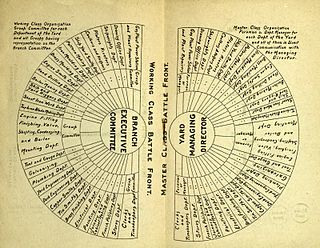
Industrial unionism is a labour union organizing method through which all workers in the same industry are organized into the same union—regardless of skill or trade—thus giving workers in one industry, or in all industries, more leverage in bargaining and in strike situations. Advocates of industrial unionism value its contributions to building unity and solidarity, many suggesting the slogans, "an injury to one is an injury to all" and "the longer the picket line, the shorter the strike."

The 1936–1937 Flint sit-down strike against General Motors changed the United Automobile Workers (UAW) from a collection of isolated locals on the fringes of the industry into a major labor union and led to the unionization of the domestic United States automobile industry.

William Dudley "Big Bill" Haywood was a founding member and leader of the Industrial Workers of the World (IWW) and a member of the executive committee of the Socialist Party of America. During the first two decades of the 20th century, Haywood was involved in several important labor battles, including the Colorado Labor Wars, the Lawrence Textile Strike, and other textile strikes in Massachusetts and New Jersey.
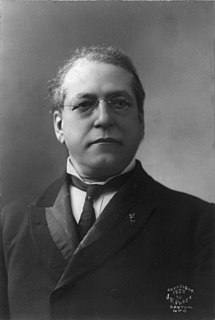
Samuel Gompers was a British-born American cigar maker, labor union leader and a key figure in American labor history. Gompers founded the American Federation of Labor (AFL), and served as the organization's president from 1886 to 1894, and from 1895 until his death in 1924. He promoted harmony among the different craft unions that comprised the AFL, trying to minimize jurisdictional battles. He promoted through organization and collective bargaining, to secure shorter hours and higher wages, the first essential steps, he believed, to emancipating labor. He also encouraged the AFL to take political action to "elect their friends" and "defeat their enemies". He mostly supported Democrats, but sometimes Republicans. He strongly opposed Socialists. During World War I, Gompers and the AFL openly supported the war effort, attempting to avert strikes and boost morale while raising wage rates and expanding membership.
The Communist Party USA and its allies played an important role in the United States labor movement, particularly in the 1930s and 1940s, but never succeeded, with rare exceptions, either in bringing the labor movement around to its agenda of fighting for socialism and full workers' control over industry, or in converting their influence in any particular union into membership gains for the Party. The CP has had only negligible influence in labor since its supporters' defeat in internal union political battles in the aftermath of World War II and the CIO's expulsion of the unions in which they held the most influence in 1950. After the expulsion of the Communists, organized labor in the United States began a steady decline.

Frank H. Little was an American labor leader who was murdered in Butte, Montana. Although no one was apprehended or prosecuted for Little's murder, many people have speculated about it. He joined the Industrial Workers of the World in 1905, organizing miners, lumberjacks, and oil field workers. He was a member of the union's Executive Board when he was murdered.

The United Steel, Paper and Forestry, Rubber, Manufacturing, Energy, Allied Industrial and Service Workers International Union, commonly known as the United Steelworkers (USW), is a general trade union with members across North America. Headquartered in Pittsburgh, the United Steelworkers represents workers in Canada, the Caribbean, and the United States. The United Steelworkers represent workers in a diverse range of industries, including primary and fabricated metals, paper, chemicals, glass, rubber, heavy-duty conveyor belting, tires, transportation, utilities, container industries, pharmaceuticals, call centers and health care.

The Women's Trade Union League (WTUL) (1903–1950) was a U.S. organization of both working class and more well-off women to support the efforts of women to organize labor unions and to eliminate sweatshop conditions. The WTUL played an important role in supporting the massive strikes in the first two decades of the twentieth century that established the International Ladies' Garment Workers' Union and Amalgamated Clothing Workers of America and in campaigning for women's suffrage among men and women workers.

Joseph James "Smiling Joe" Ettor (1885–1948) was an Italian-American trade union organizer who, in the middle-1910s, was one of the leading public faces of the Industrial Workers of the World. Ettor is best remembered as a defendant in a controversial trial related to a killing in the seminal Lawrence Textile Strike of 1912, in which he was acquitted of charges of having been an accessory.
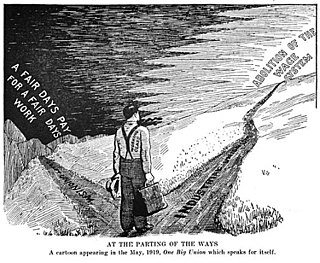
The Industrial Workers of the World (IWW) is a union of wage workers which was formed in Chicago in 1905 by militant unionists and their supporters due to anger over the conservatism, philosophy, and craft-based structure of the American Federation of Labor (AFL). Throughout the early part of the 20th century, the philosophy and tactics of the IWW were frequently in direct conflict with those of the AFL concerning the best ways to organize workers, and how to best improve the society in which they toiled. The AFL had one guiding principle—"pure and simple trade unionism", often summarized with the slogan "a fair day's pay for a fair day's work." The IWW embraced two guiding principles, fighting like the AFL for better wages, hours, and conditions, but also promoting an eventual, permanent solution to the problems of strikes, injunctions, bull pens, and union scabbing.

Maximillian S. "Max" Hayes (1866-1945) was a newspaper editor, trade union activist, and socialist politician. In 1912 Hayes became the first candidate to challenge Samuel Gompers for the presidency of the American Federation of Labor in nearly a decade, drawing about 30% of the vote in his losing effort. Hayes is best remembered as the long-time editor of the Cleveland Citizen and as the Vice Presidential candidate of the Farmer-Labor Party ticket in 1920.
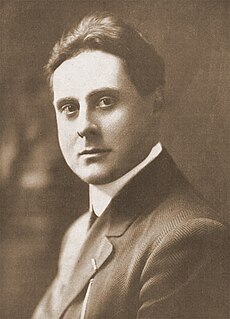
Frank Bohn was an advocate of industrial unionism who was a founding member of the Industrial Workers of the World. From 1906 to 1908 he was the National Secretary of the Socialist Labor Party of America, before leaving to join forces with the rival Socialist Party of America. After World War I his politics became increasingly nationalistic and he left the labor movement altogether.
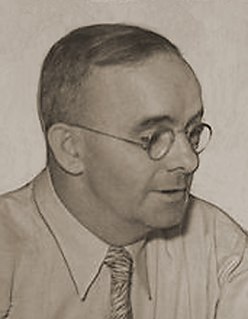
Wyndham Mortimer was an American trade union organizer and functionary active in the United Auto Workers union (UAW). Mortimer is best remembered as a key union organizer in the 1937 Flint Sit-Down Strike. Mortimer was the First Vice President of the UAW from 1936 to 1939. A member of the Communist Party USA from about 1932, Mortimer was a critic of the efforts of the conservative American Federation of Labor to control the union and was a leader of a so-called "Unity Caucus" which led the UAW to join forces with the more aggressive Congress of Industrial Organizations (CIO).

The Socialist Labor Party (SLP) is the oldest socialist political party in the United States, established in 1876.

The Congress of Industrial Organizations (CIO) was a federation of unions that organized workers in industrial unions in the United States and Canada from 1935 to 1955. Created in 1935 by John L. Lewis, who was a part of the United Mine Workers (UMW), it was originally called the Committee for Industrial Organization but changed its name in 1938 when it broke away from the American Federation of Labor. It also changed names because it was not successful with organizing unskilled workers with the AFL.
The Metal and Machinery Workers Industrial Union No. 440 (MMWIU) was a labor union in the United States which existed from 1907 to 1950. It organized workers in the manufacturing industry and was affiliated with the Industrial Workers of the World (IWW).
The Mechanics Educational Society of America (MESA) was an independent trade union of tool-and-die-makers. First active in the automobile industry of greater Detroit, Michigan, MESA was founded in 1933 and was "the first union to effectively establish itself in what had been a traditionally open shop strong, Detroit's mass production automobile industry." MESA's general secretary was English immigrant Matthew Smith.
References
- ↑ "Obituary: Frank Cedervall, 94, union orator". libcom.org.